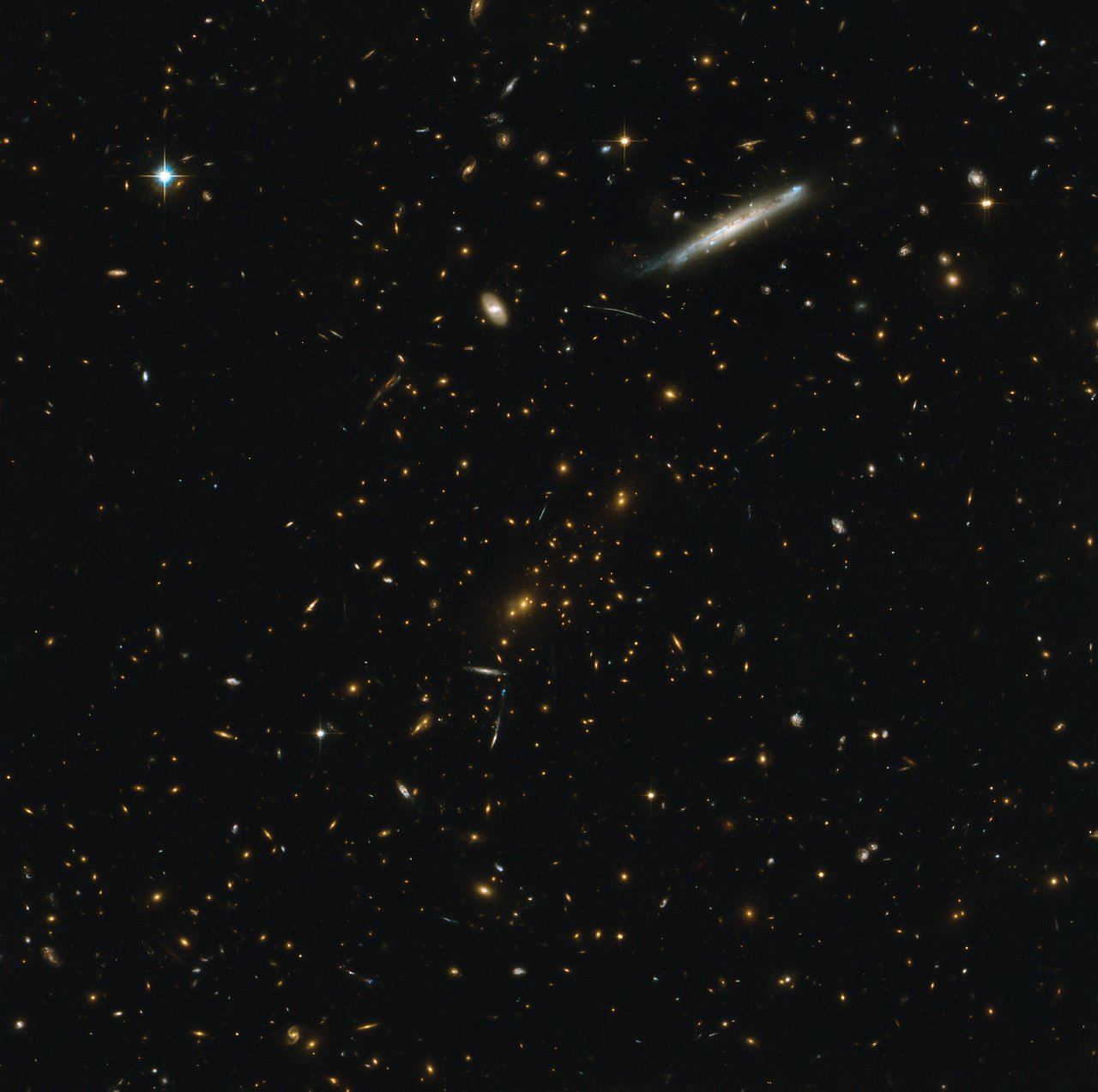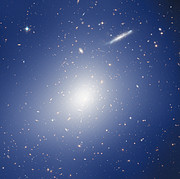Imagen de comparación: HAWK-I y Hubble exploran un cúmulo con la masa de dos mil billones de soles


Esta imagen muestra algo espectacular: ¡un cúmulo de galaxias tan masivo que está deformando el espacio a su alrededor! El cúmulo, cuyo corazón está en el centro de la imagen, recibe el nombre de RCS2 J2327, y es uno de los cúmulos más masivos que se conocen a su distancia o más allá.
Los objetos masivos como RCS2 J2327 tienen una influencia tan grande sobre su entorno que, efectivamente, deforman el espacio que los rodea – a esto se le conoce como efecto de lente gravitacional, y puede causar que la luz proveniente de objetos más distantes se curve, distorsione y amplifique, permitiéndonos ver galaxias que, de otro modo, estarían demasiado lejos de nosotros como para poder detectarlas. Las lentes gravitacionales fueron predichas por la Teoría de la Relatividad General de Albert Einstein, y pueden observarse de tres maneras distintas: lente gravitacional fuerte, débil y microlente. A diferencia de la lente gravitacional fuerte, que produce imágenes espectaculares de galaxias distorsionadas, arcos de gran amplitud y fenómenos conocidos como anillos de Einstein, la lente gravitacional débil se estudia más a nivel estadístico – pero ofrece una forma de medir las masas de objetos cósmicos, como se muestra aquí.
Esta imagen es una combinación de observaciones realizadas por el instrumento HAWK-I, instalado en el Very Large Telescope de ESO, y por la Cámara Avanzada para rastreos, instalada en el Telescopio Espacial Hubble de NASA/ESA, e ilustra un enfoque colaborativo notablemente detallado del estudio de lentes gravitacionales débiles en el cosmos. ¡El estudio mostró que RCS2 J2327 contiene la masa de dos mil billones de soles!
Usando la barra deslizante se hace visible un mapa de la masa, que muestra la cantidad de masa que se espera contenga cada parte del cúmulo en su interior. La creación del mapa fue posible gracias a las mediciones exactas de la cantidad de lente gravitacional en las distintas áreas del cúmulo.
Enlaces
- HAWK-I y Hubble exploran un cúmulo con la masa de dos mil billones de soles
- Cúmulo RCS2 J2327
- Artículo científico de Schrabback et al.
Crédito
ESO
Sobre la Comparación de la Imagen
| Identificador: | potw1752a |
| Fecha de publicación: | 25 de Diciembre de 2017 a las 06:00 |
Imágenes
Our use of Cookies
We use cookies that are essential for accessing our websites and using our services. We also use cookies to analyse, measure and improve our websites’ performance, to enable content sharing via social media and to display media content hosted on third-party platforms.
ESO Cookies Policy
The European Organisation for Astronomical Research in the Southern Hemisphere (ESO) is the pre-eminent intergovernmental science and technology organisation in astronomy. It carries out an ambitious programme focused on the design, construction and operation of powerful ground-based observing facilities for astronomy.
This Cookies Policy is intended to provide clarity by outlining the cookies used on the ESO public websites, their functions, the options you have for controlling them, and the ways you can contact us for additional details.
What are cookies?
Cookies are small pieces of data stored on your device by websites you visit. They serve various purposes, such as remembering login credentials and preferences and enhance your browsing experience.
Categories of cookies we use
Essential cookies (always active): These cookies are strictly necessary for the proper functioning of our website. Without these cookies, the website cannot operate correctly, and certain services, such as logging in or accessing secure areas, may not be available; because they are essential for the website’s operation, they cannot be disabled.
Functional Cookies: These cookies enhance your browsing experience by enabling additional features and personalization, such as remembering your preferences and settings. While not strictly necessary for the website to function, they improve usability and convenience; these cookies are only placed if you provide your consent.
Analytics cookies: These cookies collect information about how visitors interact with our website, such as which pages are visited most often and how users navigate the site. This data helps us improve website performance, optimize content, and enhance the user experience; these cookies are only placed if you provide your consent. We use the following analytics cookies.
Matomo Cookies:
This website uses Matomo (formerly Piwik), an open source software which enables the statistical analysis of website visits. Matomo uses cookies (text files) which are saved on your computer and which allow us to analyze how you use our website. The website user information generated by the cookies will only be saved on the servers of our IT Department. We use this information to analyze www.eso.org visits and to prepare reports on website activities. These data will not be disclosed to third parties.
On behalf of ESO, Matomo will use this information for the purpose of evaluating your use of the website, compiling reports on website activity and providing other services relating to website activity and internet usage.
Matomo cookies settings:
Additional Third-party cookies on ESO websites: some of our pages display content from external providers, e.g. YouTube.
Such third-party services are outside of ESO control and may, at any time, change their terms of service, use of cookies, etc.
YouTube: Some videos on the ESO website are embedded from ESO’s official YouTube channel. We have enabled YouTube’s privacy-enhanced mode, meaning that no cookies are set unless the user actively clicks on the video to play it. Additionally, in this mode, YouTube does not store any personally identifiable cookie data for embedded video playbacks. For more details, please refer to YouTube’s embedding videos information page.
Cookies can also be classified based on the following elements.
Regarding the domain, there are:
- First-party cookies, set by the website you are currently visiting. They are stored by the same domain that you are browsing and are used to enhance your experience on that site;
- Third-party cookies, set by a domain other than the one you are currently visiting.
As for their duration, cookies can be:
- Browser-session cookies, which are deleted when the user closes the browser;
- Stored cookies, which stay on the user's device for a predetermined period of time.
How to manage cookies
Cookie settings: You can modify your cookie choices for the ESO webpages at any time by clicking on the link Cookie settings at the bottom of any page.
In your browser: If you wish to delete cookies or instruct your browser to delete or block cookies by default, please visit the help pages of your browser:
Please be aware that if you delete or decline cookies, certain functionalities of our website may be not be available and your browsing experience may be affected.
You can set most browsers to prevent any cookies being placed on your device, but you may then have to manually adjust some preferences every time you visit a site/page. And some services and functionalities may not work properly at all (e.g. profile logging-in, shop check out).
Updates to the ESO Cookies Policy
The ESO Cookies Policy may be subject to future updates, which will be made available on this page.
Additional information
For any queries related to cookies, please contact: pdprATesoDOTorg.
As ESO public webpages are managed by our Department of Communication, your questions will be dealt with the support of the said Department.

